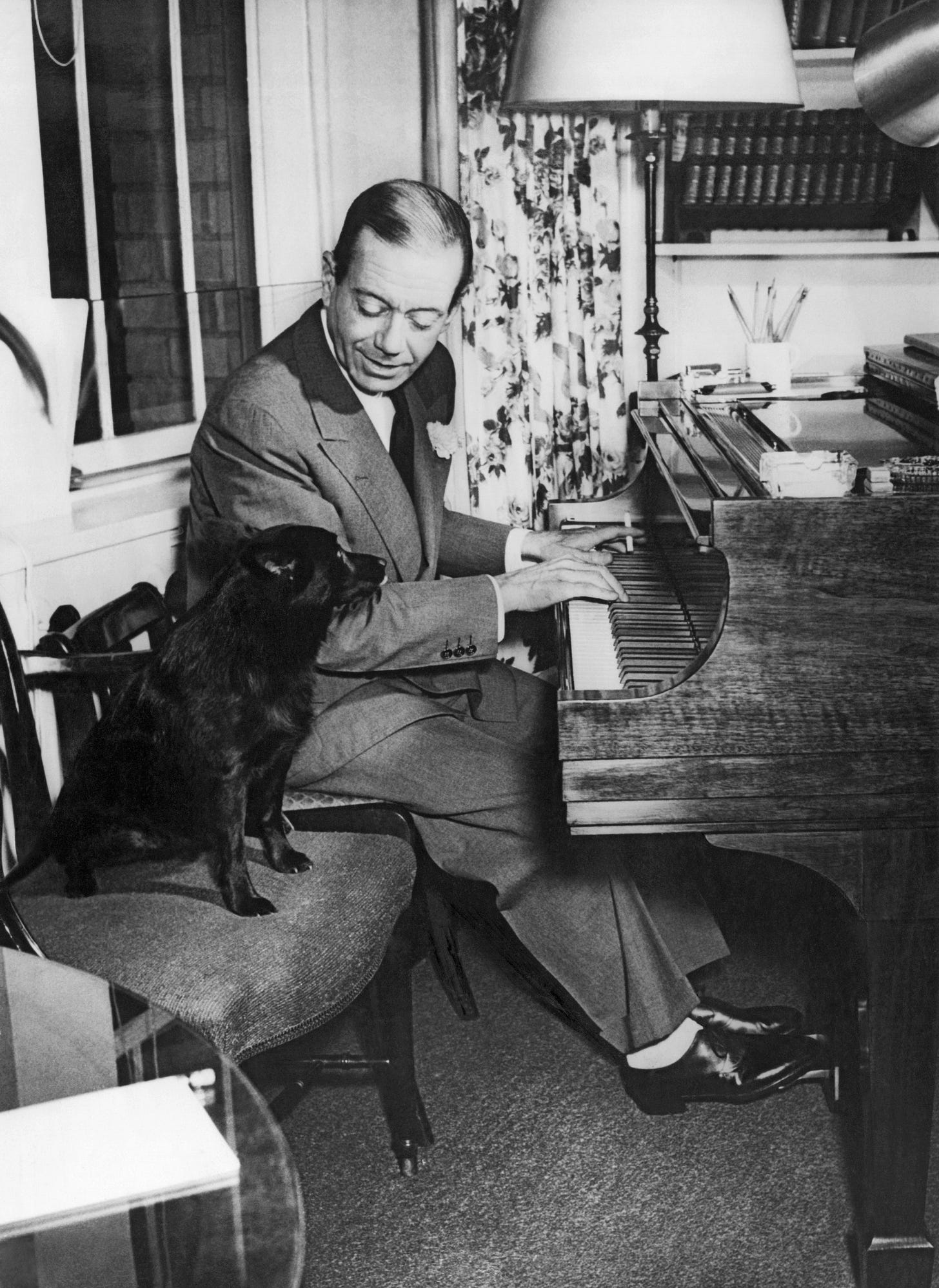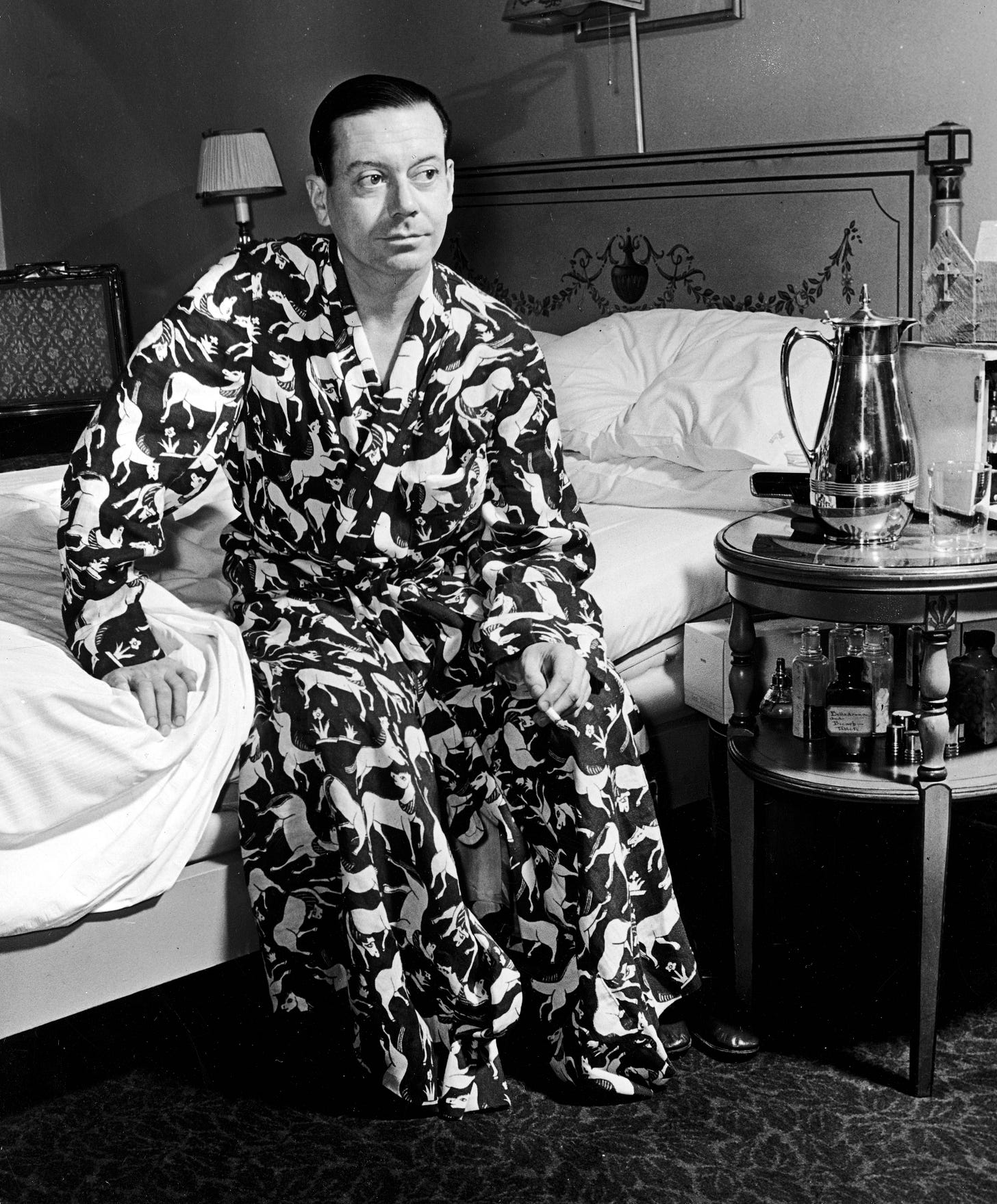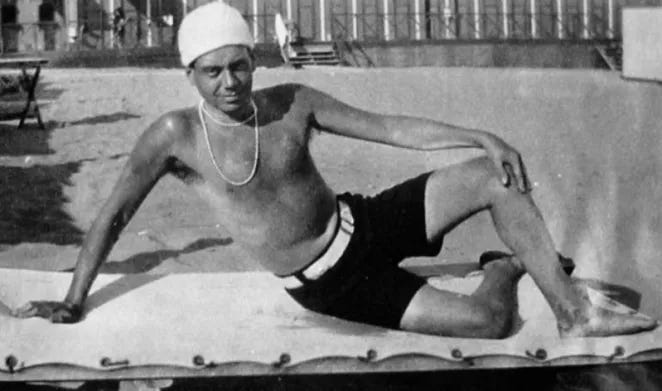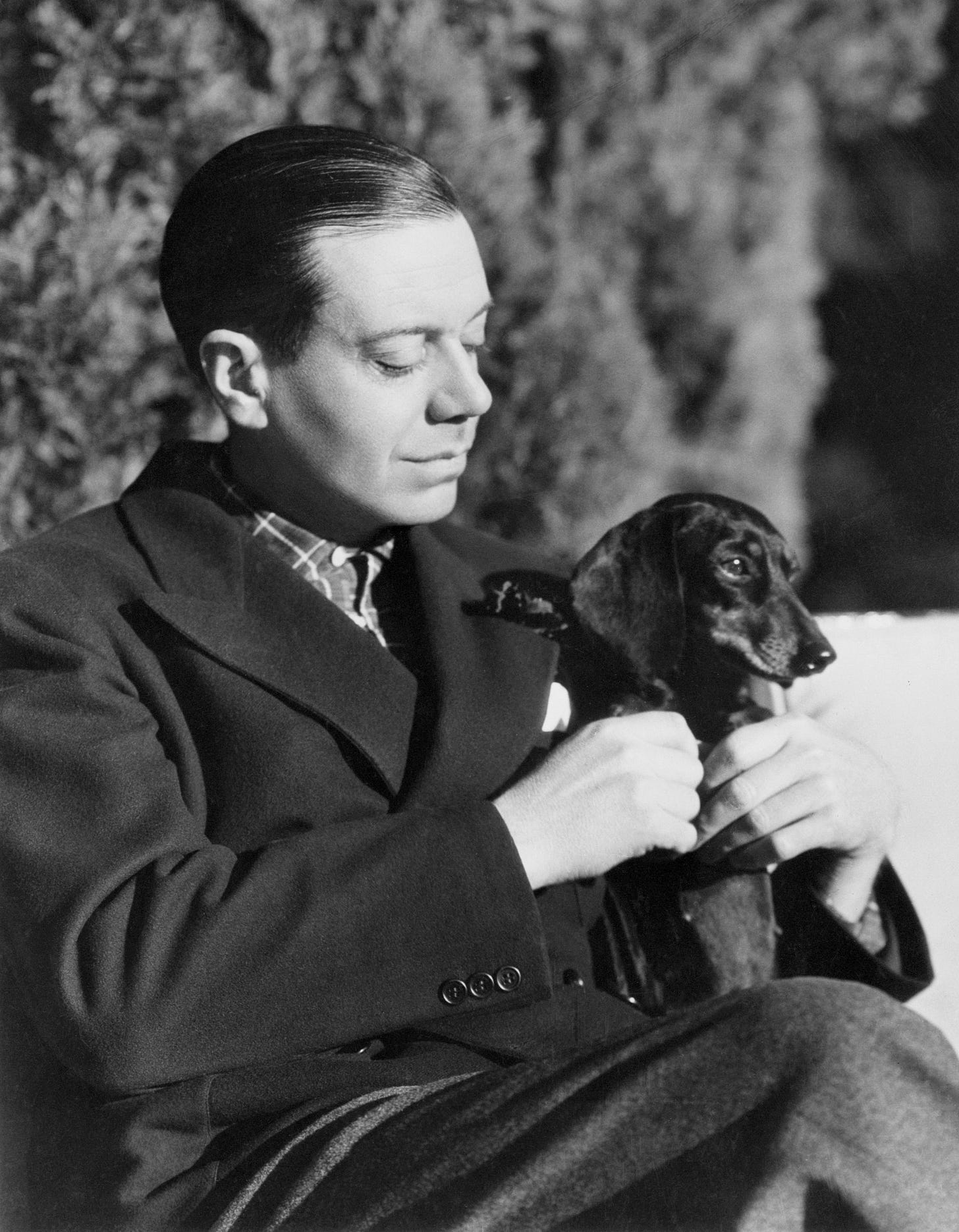Cole Porter
"No lyricist with so light a touch ever packed so powerful a punch."
Art Dogs is a weekly dispatch introducing the pets—dogs, yes!, but also cats, lizards, marmosets, and more—that were kept by our favorite artists. Subscribe to receive these weekly posts to your email inbox.
Cole Porter was born in Peru, Indiana, in 1891 to perhaps the wealthiest family in the entire state. Though he was raised in affluence, he became “a working stiff” in music, producing an “inhuman” number of commercial songs in his lifetime.1 More than 800 of his songs survive, including scores for more than thirty-five theatrical shows and twelve musical films. Of the hundreds of songs he wrote, some have estimated that more than 30 are masterpieces (peruse his songbook here). Many of them you may not realize were written by Cole, like this one:
Cole Porter was a shape-shifter in more than just class terms. He composed music and wrote lyrics. He married a woman and was unapologetically queer. He was born to the upper crust, but rhymed in effortless slang. As The New York Times wrote:
“The supreme tunesmith who's also a sublime wordsmith is that rarest of mixed breeds — about as rare as the trust-fund playboy who's also a workaholic prodigy, or the cosmopolitan dandy who's fluent in streetwise American lingo.”
After attending a prestigious private high school, Cole Porter went to Yale—where he was president of the Glee club and a football cheerleader—then Harvard right as World War I began. While his service in the war remains hard to confirm, his party life in Europe is not.
At 26 years-old, he set himself up in a luxury apartment in Paris that he decorated with platinum wallpaper and chairs upholstered in zebra skin.2 He entertained lavishly. “His parties were extravagant and scandalous, with much gay and bisexual activity, Italian nobility, cross-dressing, international musicians and a large surplus of recreational drugs.”3 Soon after arriving in Paris he married Linda Lee Thomas, a widowed socialite who helped him obscure his sexuality.
Before he ever wrote a hit song, Cole and Linda rented an epic eighteenth century palazzo on Venice’s Grand Canal for the equivalent of $60,000 a month today. Inside, they hosted legendary parties, including hiring Serge Diaghilev’s Ballet Russes to entertain their guests one evening, and another night paying fifty gondoliers while a troupe of tightrope walkers performed above their palazzo.4
In this microclimate, Cole Porter was “about as out as a man could be.”5 It’s said that his queerness “seems never to have tormented him,”—quite a feat for the era. I love this passage in The New Yorker about how limber his resulting lyrics could be:
“Let’s Misbehave” spoke as clearly to straying straights as it did to cruising gays. The sport of writing in a tightly organized genre like popular song is not to smuggle in specifically subversive subtext when the censors aren’t looking but to make the subversive emotions universal enough not to need a subtext. Porter was to straight sex…as his best friend, Irving Berlin, was to Christianity in writing “White Christmas”—the outsider’s triumph was to own the insider’s material. It may be, as some have suggested, that the climactic lines “But if, baby, I’m the bottom / You’re the top” in Porter’s “You’re the Top” already meant…what they mean in erotic slang now; the point is that, post-Porter, they no longer had to mean only that.
Drawing on his life in Europe, Cole Porter wrote his first hit, “Let's Do It, Let's Fall in Love,” in 1928. (His dog, Jezebel, came into his life just a few years before.)
You can hear his talent at wordplay in this early hit. "I do the lyrics the way I'd do a crossword puzzle," he once reflected. Let’s take a look:
Oysters down in Oyster Bay do it
Let's do it, let's fall in love
Cold Cape Cod clams, 'gainst their wish, do it
Even lazy jellyfish do it
Let's do it, let's fall in love
Electric eels, I might add, do it
Though it shocks 'em, I know
Why ask if shad do it?
Waiter, bring me shad roe!
In shallow shoals, English soles do it
Goldfish in the privacy of bowls do it
Let's do it, let's fall in love
Mosquitos, heaven forbid, do it
So does every katydid do it
Let's do it, let's fall in love
Dragonflies in the reeds do it
Sentimental centipedes do it
Let's do it, let's fall in love
The most refined ladybugs do it
When a gentleman calls
Moths in your rugs do it
What's the use of moth balls?
The locusts up in the trees do it
Even over-educated fleas do it
Let's do it, let's fall in love
During the 1930s, Cole Porter went on a hit-making tear. He wrote “Night and Day,” “Anything Goes,” “I Get a Kick Out of You,” “I Happen to Like New York,” “Don’t Fence Me In,” and “I’ve Got You Under My Skin.”
There aren’t many recordings of him singing his own songs, but in the video below you can listen to Cole Porter performing “You’re the Top” (1934). How great are these lyrics?
You’re the nimble tread of the feet
of Fred Astaire,
You’re an O’Neill drama,
You’re Whistler’s mama,
You’re Camembert.
As The New York Times noted: “at the top of his game he could be as impish as a Lewis Carroll or as waspish as a Dorothy Parker.”
After such a fruitful period, in 1937 he suffered an accident that changed his life. A horse fell on top of him while riding, crushing both of his legs. He’d undergo thirty-four operations and spent the rest of his life coping with insurmountable pain.6 It would take years before he could use the pedals on a piano again.
At times he quelled this pain with alcohol, other times with music, farting around with his wife’s dog, and, on occasion, with his dark sense of humor. He gave his lame legs names: his left was “Josephine,” and his right was “Geraldine,” whom he famously referred to as “a hellion, a bitch, a psychopath.” And he kept a little embroidered pillow in his fabulous Waldorf apartment that read (in French), “Don’t Explain–Don’t Complain.”

In 1958, Cole Porter’s life further fell apart. His mother and wife died in rapid succession, and he had his leg amputated.7
Cole Porter never wrote another song, though he lived until 1964. He hid from the outside world in his luxurious nine-room Waldorf Towers apartment. While many describe his last years as reclusive, depressive, and drug-riddled, some of his closest friends got the same old festive treatment. In an NPR interview with Cole’s longtime friend, Kitty Carlisle Hart, she recalled:
“Oh, he was just a darling. In fact, when he was really very, very ill and dying, I used to go see him in the hospital. And he would always prepare–his valet would prepare a little cocktail party with hors d’oeuvres and wine for the guests, and we’d have our tea party. He’d bring his wheelchair up, and the valet would put a chair for me, we’d face the window, talk to each other, and have a nibble, and he would be entertaining in the hospital when he was dying.”8
I wish that Cole Porter had written more during this period. I bet sex and longing weren’t the only thing the writer could turn a lasting phrase to, and I wish he’d been able to access the courage to try—that he’d turned his dark humor into lyrics, singing about his hellion leg “Geraldine” or the days he spent wheeling around his luxurious apartment drunk and depressed. The New York Times wrote of Cole Porter that “No lyricist with so light a touch ever packed so powerful a punch.” It’s the darkest moments like those when we need this kind of humor and lightness most. We need relief from artists like Cole Porter.
As a small consolation, today he still helps me fall in love over and over again with the stinky mess, the fun hell that is my home: New York City. Surely if Cole Porter can continue to trick us New Yorkers into revelry, he’s capable of helping us see the beauty in anything.
I happen to like New York, I happen to love this town
I like the city air, I like to drink of it
The more I know New York, the more I think of it
I like the sight and the sound and even the stink of it
…
I happen to like this burg, I happen to like this town
And when I have to give the world my last farewell
And the undertaker starts to ring my funeral bell
I don't wanna go to heaven, don't wanna go to hell
I happen to like New York!
I happen to love New York!
Bonus: A tour of Cole Porter’s suite at the Waldorf Astoria
You, too, can rent Cole Porter’s apartment for $140,000 a month.
(Should you endeavor to rent it, please invite me to your parties.)
https://www.newyorker.com/magazine/2020/01/20/the-pleasure-and-pain-of-being-cole-porter
https://www.nytimes.com/1964/10/16/cole-porter-is-dead.html
Bell, J. X. "Cole Porter Biography" Archived September 23, 2010, at the Wayback Machine
https://robertgreenbergmusic.com/music-history-monday-youre-the-top/
https://www.newyorker.com/magazine/2020/01/20/the-pleasure-and-pain-of-being-cole-porter
https://hometownstohollywood.com/indiana/cole-porter/
https://www.nytimes.com/1964/10/16/cole-porter-is-dead.html
https://hometownstohollywood.com/indiana/cole-porter/










Dachshund sighting!
What a life! It reminds me of Leonard Bernstein in many ways. Now I’m going to research if there’s a biopic on him... because there should be!